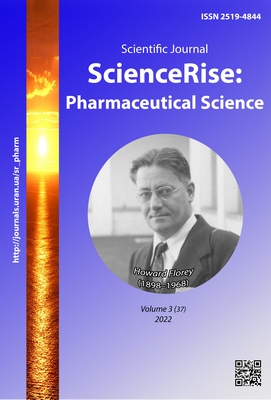Development of a method for determining the morpholinium thiazotate using more economic and green GC/MS assay with an fid detector
DOI:
https://doi.org/10.15587/2519-4852.2022.259879Keywords:
HPLC, GC-FID, method development, analytical eco-scale, cost analysis, environmental, AGREE scaleAbstract
One of the main steps in the pharmaceutical development of drugs is the choice of quality control methods. The correctness of the method must be confirmed by validation. In addition, manufacturers take into account various economic and environmental factors. It is especially important to determine the above aspects for domestic and promising drugs, such as the morpholinium thiazotate.
The aim. During the development of methods for the routine analysis of medicinal products, attention should be paid to efficiency of analysis, budget, as well as their impact to the environment. Because of this reason, not only new methods for routine analysis should be developed. It is important this methods must be environmentally-friendly and cost-efficient.
Materials and methods. The determination of the morpholinium thiazotate was carried out by HPLC using the SunFire C18 (150 mm × 4,6 mm, 5,0 μm) and gas chromatography with a flame ionization detector using the Rxi-5 ms (30 m long, 0.25 mm outer diameter and 0.25 μm liquid stationary phase thickness).
Results. Various chromatographic methods for the routine quantitative analysis of morpholinium thiazotate were developed. The most suitable conditions for sample preparation were established. Proposed methods were compared to find the most ecological and economic.
Conclusions. Proposed methods were accurate and reliable. However, an environmental impact assessment showed that GC-FID is a more environmentally friendly and economical method of analysis. Using 12 Principles of green analytical chemistry, the overall “analytical GREEnness (AGREE)” scale for the proposed analytical approach was computed 0.72, showing the good greener nature of the proposed analytical approach
References
- Iqubal, A., Iqubal, M. K., Sharma, S., Ansari, M. A., Najmi, A. K., Ali, S. M. et. al. (2019). Molecular mechanism involved in cyclophosphamide-induced cardiotoxicity: Old drug with a new vision. Life Sciences, 218, 112–131. doi: http://doi.org/10.1016/j.lfs.2018.12.018
- Zheng, Y.-Y., Ma, Y.-T., Zhang, J.-Y., Xie, X. (2020). COVID-19 and the cardiovascular system. Nature Reviews Cardiology, 17 (5), 259–260. doi: http://doi.org/10.1038/s41569-020-0360-5
- Conti, P., Ronconi, G., Caraffa, A., Gallenga, C., Ross, R., Frydas, I., Kritas, S. (2020). Induction of pro-inflammatory cytokines (IL-1 and IL-6) and lung inflammation by Coronavirus-19 (COVI-19 or SARS-CoV-2): anti-inflammatory strategies. Journal of Biological Regulators and Homeostatic Agents, 34, 327–331. doi: http://doi.org/10.23812/CONTI-E
- Belenichev, I.F., Vizir, V.A., Mamchur, V.I., Kuryata, A.V. (2019). Place of tiotriazoline in the gallery of modern metabolitotropic medicines. Zaporozhye Medical Journal, 21 (1 (112)), 118–128.
- Lautié, J.-P., Stankovic, V., Sinoquet, G. (2000). Determination of chlormequat in pears by high-performance thin layer chromatography and high-performance liquid chromatography with conductimetric detection. Analusis, 28 (2), 155–158. doi: http://doi.org/10.1051/analusis:2000109
- Calculation of production cost of products (works, services) (2013). Balance, 20, 8–9.
- Pro zatverdzhennia Metodychnykh rekomendatsii z formuvannia sobivartosti produktsii (robit, posluh) u promyslovosti (2007). Nakaz Ukrainy No. 373. 09.07.2007. Available at: https://zakon.rada.gov.ua/rada/show/v0373581-07 Last accessed: 10.04.2022
- On Approval of the Regulation (Standard) of Accounting. Available online: https://zakon.rada.gov.ua/laws/show/z0027-00 Last accessed: 29.04.2022
- Gałuszka, A., Migaszewski, Z. M., Konieczka, P., Namieśnik, J. (2012). Analytical Eco-Scale for assessing the greenness of analytical procedures. TrAC Trends in Analytical Chemistry, 37, 61–72. doi: http://doi.org/10.1016/j.trac.2012.03.013
- Globally Harmonized System of Classification and Labeling of Chemicals (2011). (GHS, Rev. 4). United Nations. New York.
- Abdelrahman, M. M., Abdelwahab, N. S., Hegazy, M. A., Fares, M. Y., EL-Sayed, G. M. (2020). Determination of the abused intravenously self-administered madness drops (Tropicamide) by liquid chromatography in rat plasma; an application to pharmacokinetic study and greenness profile assessment. Microchemical Journal, 159, 105582. doi: http://doi.org/10.1016/j.microc.2020.105582
- State Pharmacopoeia of Ukraine. Vol. 1. Kharkiv: Ukrainian Scientific Pharmacopoeial Center for Quality of Medicines.
- Raynie, D., Driver, J. L. (2009). Green assessment of chemical methods. In Proceedings of the 13th Green Chemistry & Engineering Conference. Washigton.
- Titenko, L. V. (2009). Evaluation and Calculation in the Pharmaceutical Industry. Finance, Accounting and Audit. Kyiv: KNEU.
- Pena-Pereira, F., Wojnowski, W., Tobiszewski, M. (2020). AGREE – Analytical GREEnness Metric Approach and Software. Analytical Chemistry, 92 (14), 10076–10082. doi: http://doi.org/10.1021/acs.analchem.0c01887
- Baktiyar, M. Z., Ishaq, B. M., Reddy L, S. S., Sreenivasulu, M. (2021). Method Development and Validation for Estimation of related Substances in Tilorone Dihydrochloride using RP-HPLC. Research Journal of Pharmacy and Technology, 14 (6), 3319–3324. doi: http://doi.org/10.52711/0974-360x.2021.00577
- The United Nations Secretary-General’s High-Level Panel on Access to Medicines Reports: Promoting Innovation and Access to Health Technologies (2016). UN Secretary-General, 70. Available at: http://www.unsgaccessmeds.org/s/UNSG-HLP-Report-FINAL-12-Sept-2016.pdf Last accessed: 21.08.2017
- Hill, A. M., Barber, M. J., Gotham, D. (2018). Estimated costs of production and potential prices for the WHO Essential Medicines List. BMJ Global Health, 3 (1), e000571. doi: http://doi.org/10.1136/bmjgh-2017-000571
- Overview of the Current Scenario on Traditional Medi cines, Chapter 1. IProceedings of the International Conclave on Traditional Medicine. New Delhi.
- Official hryvnia exchange rate. Available at: https://bank.gov.ua/ua/markets/exchangerates?date=20.04.2022&period=monthly Last accessed: 20 April 2022
- Heorhiivskyi, H. V. (2011). Rozrobka kompleksu fizyko-khimichnykh metodyk, shcho zabezpechuiut stvorennia ta kontrol yakosti oryhinalnykh vitchyznianykh preparativ, pokhidnykh 1,2,4-triazolu. Zaporizkyi medychnyi zhurnal, 13 (1), 58–69.
Downloads
Published
How to Cite
Issue
Section
License
Copyright (c) 2022 Anastasiia Belikova, Anna Materienko, Lyudmila Sidorenko, Vasyl Chornyi, Iuliia Korzh, Luidmula Kucherenko, Alla Kotvitska, Deividas Burdulis, Victoriya Georgiyants

This work is licensed under a Creative Commons Attribution 4.0 International License.
Our journal abides by the Creative Commons CC BY copyright rights and permissions for open access journals.







